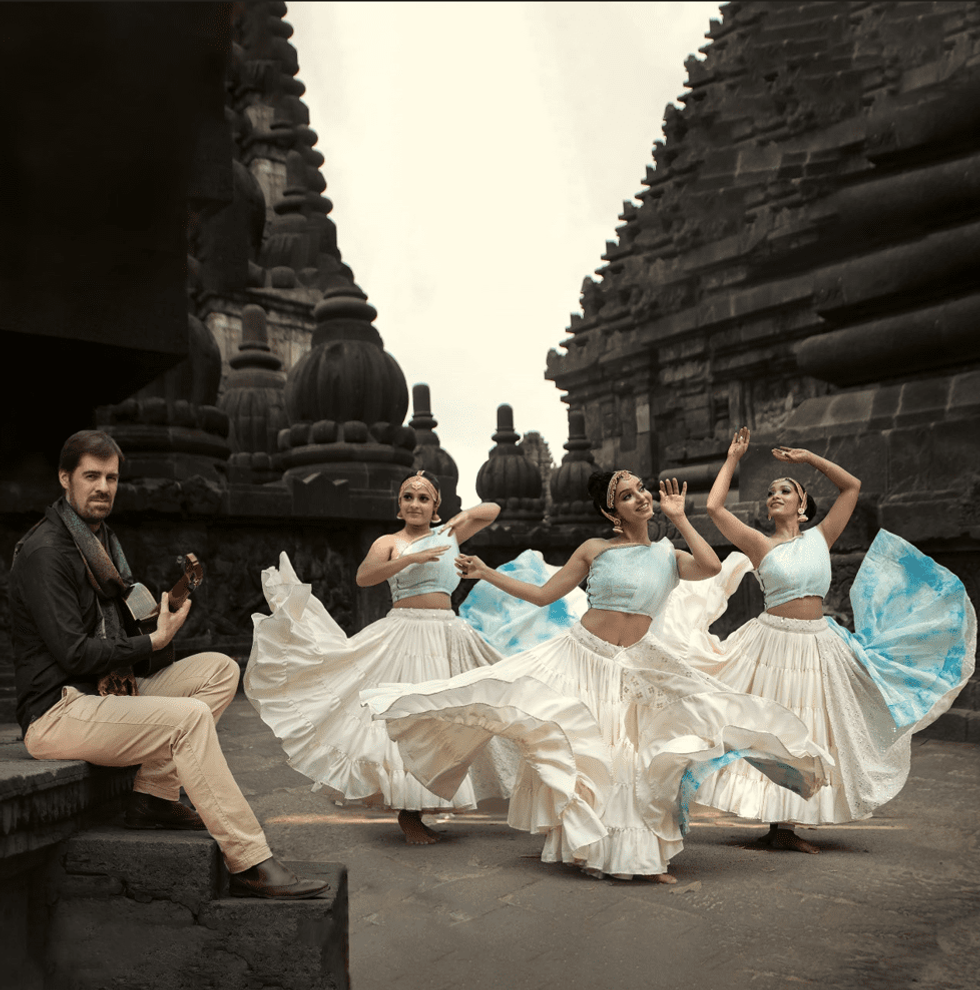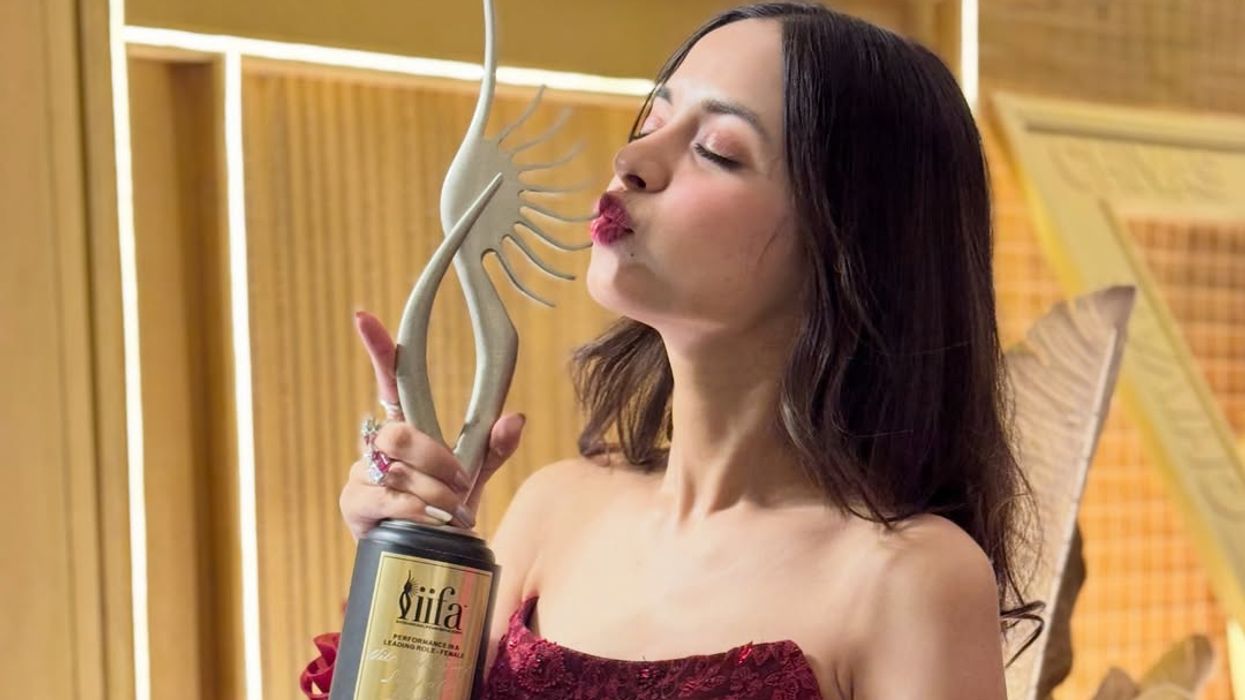A MAJOR highlight of this month’s Edinburgh Fringe Festival will be the world premiere of Tandava, which is a thrilling new collaboration between British guitarist Simon Thacker and Bangalore based Piah Dance Company.
The multi-layered music and dance production, being staged as part of the Made in Scotland showcase, adds to the impressive work done by Piah Dance Company founder Priya Varunesh Kumar. Eastern Eye got the dancer/ choreographer to select inspiring moments from her dynamic journey.
‘Find the silence in your dance’: My favourite quote by my Bharatanatyam teacher and guide, Karnataka Kalashree Smt. Minal Prabhu. Her wisdom has been the biggest blessing. I owe it all to her for nurturing me into a better dancer. She has always explained that every dancer can learn movements and grasp choreography, but that the true beauty of dance is found in the silence between the movements. This mastery of energy and form is what turns a good dancer into a great one.
Maniyaaro Raas: A popular folk dance form from Saurashtra, Gujarat. Maniyaaro Raas is a martial arts dance performed using swords and shields to symbolise valour and bravery. Having studied many forms of Gujarati and Rajasthani folk dance closely, I find that the Maniyaaro Raas uses a unique movement vocabulary. We draw on influences of both Maniyaaro Raas and Bharatanatyam in a contemporary dance setting in our Tandava production, a combination of styles never usually seen together.

MaNN Vasanai: My favourite Piah Dance Company video! I saw the sound recording take shape in a Chennai studio, so choreographing it with my Piah team in 2019 gave me a special connection. I was influenced by the devadasi culture of ancient India and the apsaras (celestial beings in Hinduism). The sound world of classical guitar, ghatam, mridangam and kanjira Simon Thacker created is so powerful. My Bharatanatyam influences are expanded with a contemporary vocabulary. We are reworking MaNN Vasanai for the Tandava production.
Hatha yoga: As a 12-yearold I stumbled upon a yoga book that my mum had bought for herself. Thus I began learning about hatha yoga. From there my journey to practising yoga along with dance started. This has been the perfect addition to my regular dance training. It has made me a stronger dancer, increasing my stamina and balance tremendously. It improves general well-being. I recommend it to everyone.
Akram Khan’s Xenos: I still remember applauding in tears and my hands trembling at the end of witnessing Xenos at the Edinburgh International Festival in 2018. I have watched Akram Khan’s work very closely. He is one of my favourite choreographers and performers. I aspire to move audiences the way Xenos moved me. Creating that emotional impact has been my vision for Tandava, as I prepare to bring it to Edinburgh Festival Fringe audiences in August.
Canon choreography in Nirjanavana: There is something deeply mesmerising about seeing the same movement being eecuted at slightly staggered intervals. Nirjanavana by Simon Thacker is a captivating soundscape that uses digital delay, an effect that repeats the same sound multiple times, like an echo. This effect is perfect for creating a canon style choreography. In a trio with Meghana Balaji and Sangeetha Jayarm, we took this concept to its limits, with a web of constantly interacting layers.
Amit Trivedi: The great music director has revolutionised the Indian film industry. Hailing from my home state of Gujarat, his roots are strongly connected to Indian folk music. He uses a lot of strong folk influences in his songs, often blending these with other genres of music. He brings us closer to Indian folk through the mainstream medium of film music.
Cold Blood: An unforgettable live, featurelength cinema-dance show by Jaco Van Dormael and Michèle Anne De Mey that I was privileged to watch as part of the Edinburgh Festival in 2018. It taught me that there is nothing more powerful than storytelling. They ingeniously used dancing fingers and hands to represent people. It had multiple sets on stage and a close up camera showing everything on a large screen. The theatrical marvel made me cry, laugh, and gave me goosebumps.
Vipassana meditation: I attended my first Vipassana retreat in 2017 in Dharamsala, India. I realised the integral role of meditation in creativity, art, and dance. Vipassana teaches you to see things as they are. I have meditated regularly since then and felt incredible benefits. To truly create, the mind first needs to be still. Along with yoga, meditating is an integral part of my creativity and artistic performance.
Samhara: Rhythm is my favourite aspect of music, and this piece pushed my boundaries in terms of movement possibilities. Being trained in Bharatanatyam, Tandava takes inspiration from our knowledge of the South Indian rhythmic language of Konnakol. Samhara is the finale of Tandava and is designed as a showstopper. It is the most intricately rhythmic choreography I have ever done and has ferocious intensity. I’m excited to see how the audience receives it.
Tandava world premiere at theSpace, Upper Theatre (venue number 9), Niddry Street, Edinburgh EH1 1TH on August 18. www.edfringe.com & Instagram: @piahdancecompany
















 Nitanshi Goel stuns in a ruby-red gown as she accepts the Best Actress award at IIFA 2025Instagram/nitanshigoelofficial
Nitanshi Goel stuns in a ruby-red gown as she accepts the Best Actress award at IIFA 2025Instagram/nitanshigoelofficial An emotional moment: Nitanshi Goel makes history as the youngest Best Actress winner at IIFA 2025Instagram/nitanshigoelofficial
An emotional moment: Nitanshi Goel makes history as the youngest Best Actress winner at IIFA 2025Instagram/nitanshigoelofficial Laapataa Ladies celebrate their ground-breaking win at IIFA 2025Instagram/nitanshigoelofficial
Laapataa Ladies celebrate their ground-breaking win at IIFA 2025Instagram/nitanshigoelofficial


 The role of Dorium was a dream come trueBBC Gallery
The role of Dorium was a dream come trueBBC Gallery The jovial ghost of Hufflepuff House at Hogwarts School of Witchcraft and Wizardry. Youtube/ Podcast 9 3/4
The jovial ghost of Hufflepuff House at Hogwarts School of Witchcraft and Wizardry. Youtube/ Podcast 9 3/4